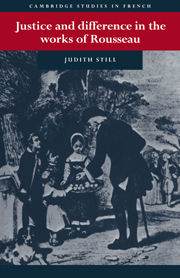Book contents
- Frontmatter
- Contents
- Acknowledgements
- A preliminary note on vocabulary and conventions
- Introduction
- Chapter 1 The problem: the intersection of beneficence and pudicity
- Chapter 2 The code of beneficence
- Chapter 3 The practice of beneficence and model benefactors in the major works
- Chapter 4 The passion of pity in Rousseau's theory of man
- Chapter 5 Gyges' ring: a reading of Rousseau's 6e Promenade
- Chapter 6 Pudicity in some of Rousseau's minor writings: its relationship to beneficence
- Conclusion
- Appendix: Generosity and pudicity in Gyges und sein Ring and Le Roi Candaule
- Notes
- Bibliography
- Index
- Cambridge Studies in French
Conclusion
Published online by Cambridge University Press: 22 September 2009
- Frontmatter
- Contents
- Acknowledgements
- A preliminary note on vocabulary and conventions
- Introduction
- Chapter 1 The problem: the intersection of beneficence and pudicity
- Chapter 2 The code of beneficence
- Chapter 3 The practice of beneficence and model benefactors in the major works
- Chapter 4 The passion of pity in Rousseau's theory of man
- Chapter 5 Gyges' ring: a reading of Rousseau's 6e Promenade
- Chapter 6 Pudicity in some of Rousseau's minor writings: its relationship to beneficence
- Conclusion
- Appendix: Generosity and pudicity in Gyges und sein Ring and Le Roi Candaule
- Notes
- Bibliography
- Index
- Cambridge Studies in French
Summary
TOWARDS A NEW INTERPRETATION OF THE MAJOR WORKS
This book begins with a consideration of what Rousseau presents as the best possible relationship between non-equals, something which is the epitome of social virtue, that is to say beneficence. Rousseau's treatment of the relationship between benefactor and beneficiary is characteristic of the main thrust of his work. He attempts to specify conditions which promote moral freedom. A paramount condition is potential equality, an equality which may be achieved through the moral growth of the weaker party. He takes from his predecessors those elements which support this, and so his treatment of beneficence has much in common with (and indeed goes beyond) Seneca's enlightened treatise, de Beneficiis. He opposes aristocratic, hierarchical formulations such as those to be found in Aristotle. He protests fiercely against both literal and analogical situations of servitude. A study of beneficence alone would confirm that Rousseau's position is one of protest against the constant exercise of power.
However, the analysis of the relation of benefactor to beneficiary in certain of Rousseau's writings stumbles unexpectedly upon the relation of men to women. This is represented as a relation between non-equals which is constant and static. Whereas the beneficiary must be able in some way to grow to resemble the benefactor in order for the relationship to have a tendency towards equality, the relation between men and women does not have this dynamic element. The code of pudicity holds women back, preventing them from being like, or close to, men.
- Type
- Chapter
- Information
- Justice and Difference in the Works of RousseauBienfaisance and Pudeur, pp. 188 - 196Publisher: Cambridge University PressPrint publication year: 1993



